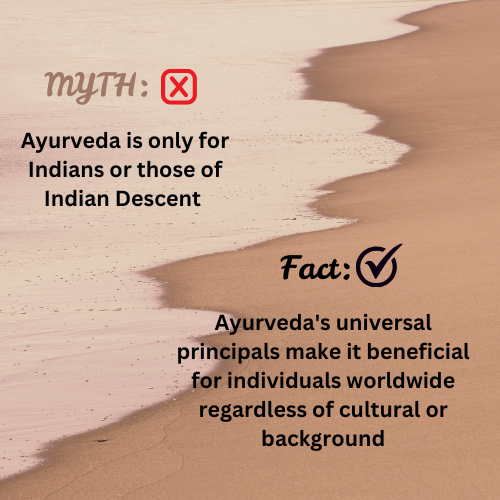Ayurveda, often termed the “Science of Life,” is one of the world’s oldest holistic healing systems. While it Ayurveda, the ancient Indian system of holistic medicine, often faces misconceptions. One of the most prevalent myths is that Ayurveda is exclusively for Indians or Hindus. However, this belief limits the universal applicability of Ayurveda, which is meant for everyone regardless of their nationality, culture, or religion. Let’s debunk this myth and explore how Ayurveda is a gift for humanity.
Understanding the Origins of Ayurveda
Ayurveda, translating to “the science of life,” is a 5,000-year-old medical system that originated in India. It emphasizes balancing the body, mind, and spirit for overall health and well-being. Key principles include the three doshas (Vata, Pitta, and Kapha), the role of diet, lifestyle, and natural remedies in maintaining health.
Debunking the Myth: Ayurveda Is Only for Indians or Hindus
Universal Roots of Ayurveda
While Ayurveda’s origins lie in ancient Indian scriptures, its principles are universally applicable. Just as yoga, also rooted in India, has found a global audience, Ayurveda offers solutions for anyone seeking natural healing.
- Holistic Healing for Everyone: Ayurveda focuses on harmony with nature, making it adaptable to people across cultures.
- Global Recognition: Institutions like the World Health Organization (WHO) recognize and promote traditional medicine, including Ayurveda, as an effective alternative to modern medicine.
Religious Neutrality of Ayurveda
Although Ayurveda has deep connections with Indian culture, it is not tied to any particular religion. Its remedies, dietary advice, and lifestyle recommendations are secular, designed to promote wellness for everyone.
- Ayurveda and Science: Its practices are based on observations of nature and the human body, not on religious beliefs.
- Ayurveda in Modern Context: Many non-Indians have adopted Ayurveda for health, with celebrities and wellness enthusiasts endorsing its benefits globally.
Global Acceptance and Applications of Ayurveda
Ayurveda in the West
Countries like the USA, UK, and Germany have embraced Ayurveda in their wellness and spa industries. Ayurvedic practices such as Abhyanga (oil massage) and Panchakarma (detoxification) are popular among people seeking holistic health.
Ayurvedic Research and Development
Modern research highlights the efficacy of Ayurvedic remedies for conditions like stress, digestion, and chronic diseases. Institutes around the world, including the National Center for Complementary and Integrative Health (NCCIH), study its benefits.
Breaking the Stereotype Through Accessibility
Today, Ayurvedic products are available worldwide, from herbal teas to skincare products. With online consultations, Ayurvedic experts provide advice tailored to individual needs, transcending geographical boundaries.
Key Examples
Products inspired by Ayurvedic principles, such as herbal teas, skincare items, and dietary supplements, are available in global markets. These products cater to increasing consumer interest in natural and sustainable health solutions.
Ayurvedic Tourism
Certain regions, such as parts of India and Sri Lanka, are known for their Ayurveda-based wellness retreats. These destinations attract international visitors seeking detoxification, stress relief, and rejuvenation through traditional therapies.

Conclusion
Ayurveda is not limited by geography, culture, or religion. It is a timeless science offering solutions for modern health challenges, emphasizing the harmony of the body and nature. The idea that Ayurveda is only for Indians or Hindus is a misconception; instead, it’s a universal treasure for anyone seeking natural well-being.
Learn more about Ayurveda and its global applications on the World Health Organization’s page on traditional medicine.
